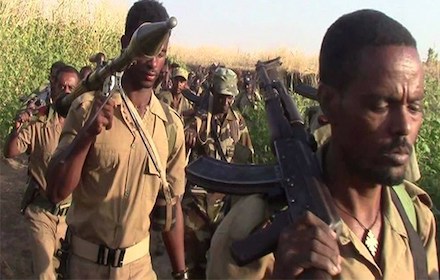www.aljazeerah.info
Opinion Editorials, February 2017
Archives
Mission & Name
Conflict Terminology
Editorials
Gaza Holocaust
Gulf War
Isdood
Islam
News
News Photos
Opinion Editorials
US Foreign Policy (Dr. El-Najjar's Articles)
www.aljazeerah.info
|
Ethiopia: From a Peaceful Protest to an Armed Uprising By Graham Peebles Redress, Al-Jazeerah, CCUN, February 21, 2017 |
 |
 |
|
| Rebels in northern Ethiopia, 2017 |
What began as a regional protest movement in Ethiopia in November 2015 is in danger of becoming a fully-fledged armed uprising.
Angered and exasperated by the government’s intransigence and duplicity, small guerrilla groups made up of local armed people have formed in Amhara and elsewhere, and are conducting hit-and-run attacks on security forces. Fighting at the beginning of January in the north-western region of Benishangul Gumuz saw 51 regime soldiers killed, the independent news outlet ESAT News, based in Europe and the United States, reported, and in the Amhara region a spate of incidents has occurred, notably a grenade attack on a hotel in Gondar and an explosion in Bahir-Dah.
In what appears to be an escalation in violence, in Belesa, an area north of Gondar, a fire-fight between “freedom fighters”, as they are calling themselves, and the military resulted in deaths on both sides. There have also been incidents in Afar, where people are suffering the effects of drought: two people were recently killed by security personnel and others were arrested. The Afar Human Rights Organisation told ESAT that the government has stationed up to 6,000 troops in the region, which has heightened tensions and fuelled resentment.
Given the government’s obduracy, the troubling turn of events was perhaps to be expected. However, such developments do not bode well for stability in the country or the wider region, and enable the ruling regime to slander opposition groups as “terrorists”, and implement more extreme measures to clamp down on public assembly in the name of “national security”.
Until recently those calling for change had done so in a peaceful manner; security in the country – the security of the people – is threatened not by opposition groups demanding that human rights be observed and the constitution be upheld, but by acts of state terrorism, the real and pervasive menace in Ethiopia.
Oppressive state of emergency
Oromia and Amhara are homelands to the country’s two biggest ethnic groups, together comprising around 65 per cent of the population. Demonstrations began in Oromia: thousands took to the streets over a government scheme to expand Addis Ababa onto Oromo farmland (plans later dropped), and complaints that the Oromo people had been politically marginalised. Protests expanded into the Amhara region in July 2016, over the appropriation of fertile land in the region by the authorities in Tigray – a largely arid area.
The regime’s response has been consistently violent and has fuelled more protests, motivated more people to take part, and brought suppressed anger towards the ruling Ethiopian People’s Revolutionary Democratic Front (EPRDF) to the surface. Regional, issue-based actions quickly turned into a nationwide protest movement calling for the ruling party, which many view as a dictatorship, to step down, and for democratic elections to be held.
Unwilling to enter into dialogue with opposition groups, and unable to contain the movement that swept through the country, in October 2016 the government imposed a six-month state of emergency. This was necessary, the prime minister claimed, because “we want to put an end to the damage that is being carried out against infrastructure projects, education institutions, health centres, administration and justice buildings”. He added that “we put our citizens’ safety first”.
The extraordinary directive, which has dramatically increased tensions in the country, allows for even tighter restrictions to be applied (e.g. post an update on Facebook about the unrest and face five years imprisonment) and is further evidence of both the government’s resistance to reform and its disregard for the views of large sections of the population.
The directive places stifling restrictions on basic human rights, and, as Human Rights Watch states, goes “far beyond what is permissible under international law and signals an increased militarised response to the situation.”
Among the 31 articles of the directive, “Communication instigating protest and unrest” is banned. This includes using social media to organise public gatherings. Also banned is “Communication with terrorist groups”, which doesn’t mean the likes of Islamic State group but relates to any individual or group whom the regime define as “terrorists”, i.e. anyone who publicly disagrees with it.
Both ESAT and Oromia Media meet the terrorist criteria, as defined by the EPRDF, and are high up the excluded list. Public assembly without authorisation is not allowed. There is even a ban on making certain gestures “without permission”. Specifically, crossing arms above the head to form an X, which has become a sign of national unity against the regime, and was bravely displayed by Ethiopian marathon runner Feyisa Lilesa, at the Rio Olympics.
If anyone is found to have violated any of the draconian articles they can be arrested without charge and imprisoned without due process. The ruling regime, which repeatedly blames so called “outside forces” for fuelling the uprising – Eritrea and Egypt are cited – says the new laws will be used to coordinate the security forces against what it ambiguously calls “anti-peace elements” that want to “destabilise the country”.
Shortly after the directive was passed, the government arrested 1,645 people, the New York Times reported, of which an astonishing 1,220 “were described as ringleaders, the rest coordinators, suspects and bandits.”
All of this is taking place in what the ruling regime and its international benefactors laughably describe as a democracy. Ethiopia is not, nor has it ever been, a democratic country. The ruling EPRDF, which, like the army, is dominated by men from the small northern Tigray region (6 per cent of the population), came to power in the traditional manner: by force. Since its assumption of power in 1992 it has stolen every “election”.
No party anywhere legitimately wins 100 per cent of the parliamentary seats in an election, but the EPRDF, knowing that its principle donors – the USA and UK – would back the result anyway, claimed to do so in 2015. The European Union, also a major benefactor, did criticise the result. However, much to the fury of Ethiopians around the world, President Barack Obama, speaking declared that the “elections put forward a democratically elected government”.
Government reaction
Since the start of the protests the government has responded with force. Nobody knows the exact number of people killed – 500, according to Human Rights Watch, possibly thousands. Tens of thousands have been arbitrarily arrested and detained, probably tortured, definitely mistreated; family members of protesters, journalists and opposition politicians are intimidated and routinely persecuted. And while 10,000 people have recently been released, local groups estimate a further 70,000 remain incarcerated and the government has initiated a new wave of arrests in which young people have been specifically targeted.
Among the list of violent state actions – none of which has been independently investigated – the incident at Bishoftu, which many Ethiopians describe as a massacre, stands out. On 2 October millions of ethnic Oromos gathered to celebrate at the annual Irreecha cultural festival. There was a heavy, intimidating military presence, including an army helicopter; anti-government chants broke out, people took to the stage and crossed their arms in unity. In response, the security forces fired live ammunition and tear gas into the crowd.
The number of casualties varies depending on the source; the government would have us believe that 55 people died, though local people and opposition groups claim 250 people were killed by the security forces. The ruling regime makes it impossible to independently investigate such incidences or to verify those killed and injured, but Human Rights Watch states that, “based on the information from witnesses and hospital staff… it is clear that the number of dead is much higher than government estimates”.
A week after the nightmare at Bishoftu, the ruling party imposed a state of emergency – another ill-judged pronouncement that has entrenched divisions, strengthened resolve and plunged the country into deeper chaos. Such actions reveal a level of paranoia, and a failure to understand the impact of repressive rule. With every controlling, violent action the government takes, with every innocent person that it kills or maims, opposition spreads, resistance intensifies and resolve grows stronger.
Enough!
The Ethiopian revolt comes after over two decades of rule by the EPRDF, a party whose approach, despite its democratic pretensions, has been intensely autocratic. Human rights, mentioned in the liberally worded constitution, are totally ignored: dissent is not allowed nor is political debate or regional secession – a major issue for the Ogaden region, which is under military control.
There are no independent media – all media are state owned or controlled, as is access to the internet. Journalists who express any criticism of the ruling regime are routinely arrested, and the only truly autonomous media group, ESAT, is now classed as a terrorist organisation. Add to this list the displacement of indigenous people to make way for international industrial farms; the partisan distribution of aid, employment opportunities and higher education places; the promulgation of ethnic politics in schools; and the soaring cost of living, and a different, less polished Ethiopian picture begins to surface than the one painted by the regime and donor nations – benefactors who, by their silence and duplicity, are complicit in the actions of the EPRDF government.
People have had enough of such injustices. Inhibited and contained for so long, they have now found the strength to demand their rights and stand up to the bully enthroned in Addis Ababa. The hope must be that change can be brought about by peaceful means and not descend into a bloody conflict. For this to happen the government needs to adopt a more conciliatory position and listen to the people’s legitimate concerns.
This unprecedented uprising may be held at bay for a time, restrained by force and unjust legislation, but people rightly sense this is the moment for change. They will no longer cower and be silenced for too much has been sacrificed by too many.
***Share the link of this article with your facebook friends
|
|
|
|
||
|
||||||


